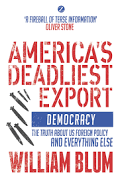By Doreen Muyonga
The author of the book America’s Deadliest Export William Blum who recently passed on in December 2018 at 85 years was an American historian and journalist with expertise in America’s Foreign Policy.
He was also the author of the controversial book Rogue State: A Guide to the World’s Only Superpower which even got praise from famed terrorist, Osama Bin Laden and a recommended for Americans specifically by President Bush to read.
Blum was a strong critic of US foreign policy, he once served at the US
The book aims at condemning individuals from President Bush, Clinton, and Obama to senior officers like Condoleezza Rice, Hillary Clinton to the military. The Scholar also discusses matters ranging from conspiracies, terrorism, religion, ideology, media, WikiLeaks to Cuba, Iran, Iraq, Afghanistan, Yugoslavia and Libya.
In addition, Blum draws on Nazi Germany and Roman history to argue America’s continued quest for global presence and power. The Scholar further brings in WWII and the Pre War Soviet Union to demonstrate that the consequences of America’s interventions in the last 65years are impacting on policy to date and that the same mistakes are being replicated by successive administrations in the post-cold war era.
Blum argues that US foreign policy is primarily influenced by domestic issues such as politics, media, elites, ideology, morals, religion and resistance.
More importantly, the US has thrived in creating myths to elicit sufficient public support for its policies using propaganda and indoctrination. Further, Blum repeatedly accuses the American public of short-sightedness and lack of political and intellectual sophistication.

Additionally, the scholar faults capitalism and urges America’s public and the entire world to forge a violent revolution to curb what he calls the imperial beast.
The book further showcases the multiple atrocities America has committed. Blum exposes that the US bombed Korea, Vietnam, Cambodia, El Salvador, Nicaragua, China, Guatemala, Indonesia, Cuba, Congo, Lebanon, Grenada, Panama, Iraq, Afghanistan, Pakistan, Somalia, Yemen, Yugoslavia, and Libya all in the name of spreading democracy and fighting terrorism.
These have had devastating and
For instance, Blum expounds on the human rights abuses by the Bush administration against its soldiers. The Scholar reveals America’s close ties with states of questionable conduct like Indonesia. He also questions the relevance and conduct of NATO.
Blum strongly believes that the Cold war was never a scuffle between US and Soviet Union. Rather, it was a brawl between the US repressive regime and people of third world countries who desired economic and political change. Blum concludes that no public relations exercise whatsoever can save America from draconian policies which have eroded its image globally.
The central thesis of this book, Blum is that for far too long, America has made us, to believe that it means well with regards to its noble global mission of spreading democracy yet the world continues to bear pain, anguish, suffering, and deaths caused by these flawed policies.
The Scholar exposes that America’s self-proclaimed role of democratizing the world is extremely cosmetic, its actual agenda is to satisfy its selfish interests. The author further pokes holes into the conduct of the US since WWII and reveals that the US has sought to overthrow 50 governments, meddled in elections of 30 states, attempted to assassinate more than 50 world leaders, bombed 30 states and suppressed nationalist movements in 20 states in order to realize its ambition of world domination.
Right from the cover page to the title, the book is highly sensational and alarming yet there is nothing new and surprising being argued since the world is alive to the fact that the US is constantly interfering in affairs of other states for own selfish interests.
The book lacks a consistent chronological flow of thematic ideas, the author haphazardly picks case studies without a clear plan in order to generate the 26 chapters.
No doubt, the late Scholar is quite courageous, he takes on unpleasant themes and uses history to frame them within current affairs to showcase the realities and atrocities of the US Foreign Policy. In this regard, the book is a
These














